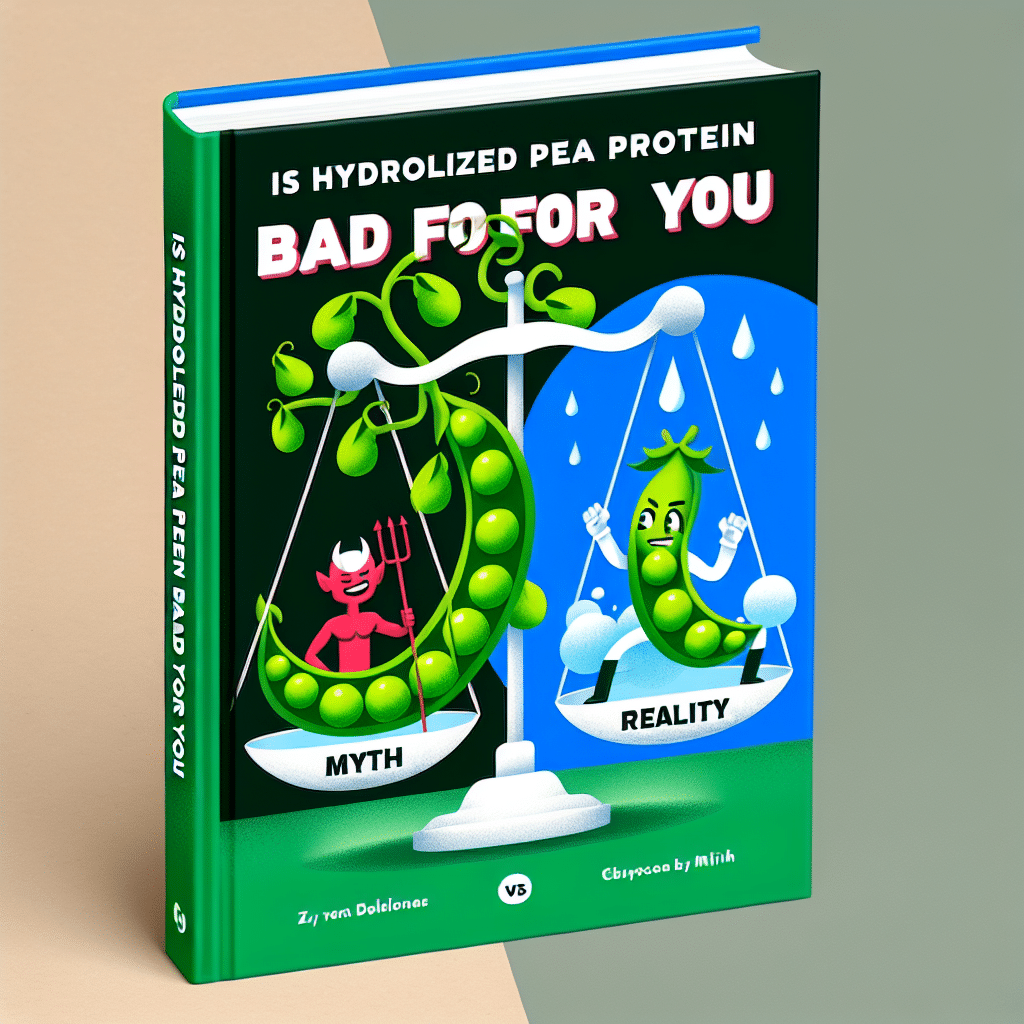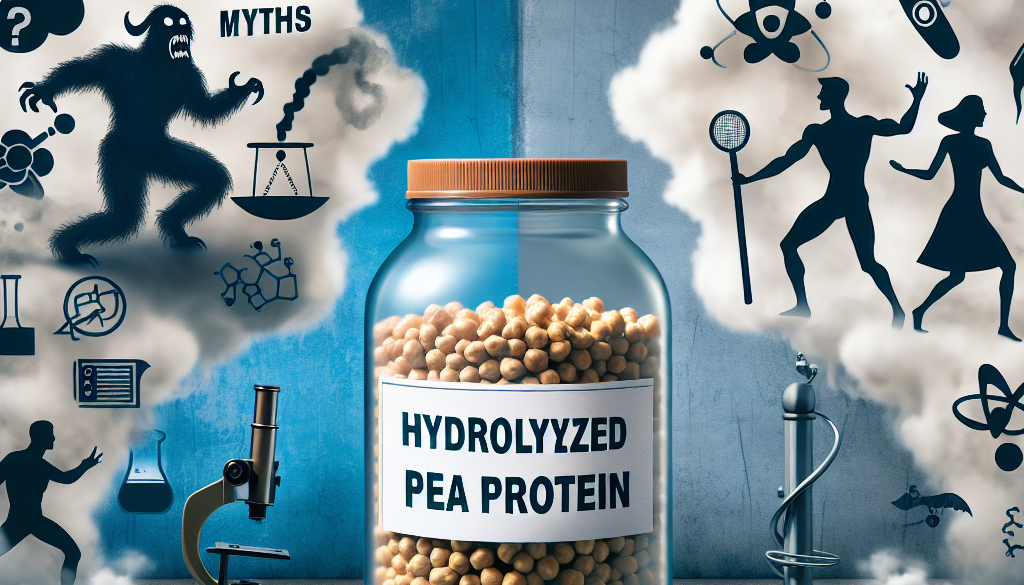Is Hydrolyzed Pea Protein Bad for You: Myth vs Reality
-
Table of Contents
- Is Hydrolyzed Pea Protein Bad for You: Myth vs Reality
- What is Hydrolyzed Pea Protein?
- The Nutritional Profile of Hydrolyzed Pea Protein
- Myth: Hydrolyzed Pea Protein Causes Digestive Issues
- Reality: Hydrolyzed Pea Protein is a Complete Protein Source
- Myth: Hydrolyzed Pea Protein is Inferior to Animal-Based Proteins
- Reality: Hydrolyzed Pea Protein is a Sustainable and Environmentally-Friendly Option
- Conclusion
- About ETprotein
Is Hydrolyzed Pea Protein Bad for You: Myth vs Reality

Hydrolyzed pea protein has gained popularity in recent years as a plant-based alternative to animal-based protein sources. However, there have been concerns raised about its safety and potential negative effects on health. In this article, we will explore the myth and reality surrounding hydrolyzed pea protein to provide you with a comprehensive understanding of its benefits and potential drawbacks.
What is Hydrolyzed Pea Protein?
Hydrolyzed pea protein is derived from yellow peas, also known as Pisum sativum. It is produced by breaking down the protein into smaller peptides through a process called hydrolysis. This process enhances the digestibility and absorption of the protein, making it easier for the body to utilize.
The Nutritional Profile of Hydrolyzed Pea Protein
Hydrolyzed pea protein is a rich source of essential amino acids, including branched-chain amino acids (BCAAs) such as leucine, isoleucine, and valine. These amino acids play a crucial role in muscle protein synthesis and repair, making hydrolyzed pea protein an excellent choice for athletes and individuals looking to build or maintain muscle mass.
Additionally, hydrolyzed pea protein is low in fat and carbohydrates, making it suitable for those following a low-calorie or low-carbohydrate diet. It is also naturally free from cholesterol and lactose, making it a suitable option for individuals with dietary restrictions or intolerances.
Myth: Hydrolyzed Pea Protein Causes Digestive Issues
One of the most common concerns surrounding hydrolyzed pea protein is its potential to cause digestive issues such as bloating, gas, and stomach discomfort. However, this claim is largely a myth.
While some individuals may experience digestive issues when consuming pea protein, it is important to note that these symptoms are not exclusive to hydrolyzed pea protein. Digestive issues can occur with any type of protein, including animal-based proteins. The key factor that determines whether an individual experiences digestive issues is their individual tolerance to protein, rather than the specific type of protein consumed.
Furthermore, hydrolyzed pea protein undergoes a process that breaks down the protein into smaller peptides, which can actually improve digestibility and reduce the likelihood of digestive issues. This makes hydrolyzed pea protein a suitable option for individuals with sensitive digestive systems.
Reality: Hydrolyzed Pea Protein is a Complete Protein Source
Another concern raised about hydrolyzed pea protein is its amino acid profile and whether it provides all the essential amino acids required by the body. However, this concern is not supported by reality.
Hydrolyzed pea protein is considered a complete protein source, meaning it contains all nine essential amino acids that the body cannot produce on its own. While pea protein is lower in certain amino acids compared to animal-based proteins, it can be easily complemented with other plant-based protein sources to ensure a well-rounded amino acid profile.
For example, combining hydrolyzed pea protein with rice protein can provide a complete amino acid profile that is comparable to animal-based proteins. This makes hydrolyzed pea protein a suitable option for individuals following a vegan or vegetarian diet.
Myth: Hydrolyzed Pea Protein is Inferior to Animal-Based Proteins
There is a common misconception that plant-based proteins, including hydrolyzed pea protein, are inferior to animal-based proteins in terms of their quality and ability to support muscle growth and recovery. However, this myth is not supported by scientific evidence.
Multiple studies have shown that hydrolyzed pea protein is just as effective as animal-based proteins in promoting muscle protein synthesis and recovery after exercise. In fact, a study published in the Journal of the International Society of Sports Nutrition found that hydrolyzed pea protein was equally effective as whey protein, a popular animal-based protein, in promoting muscle protein synthesis in young men.
This evidence suggests that hydrolyzed pea protein can be a viable alternative to animal-based proteins for individuals looking to optimize their muscle growth and recovery.
Reality: Hydrolyzed Pea Protein is a Sustainable and Environmentally-Friendly Option
One of the key advantages of hydrolyzed pea protein is its sustainability and positive impact on the environment. Peas are nitrogen-fixing plants, which means they have the ability to convert nitrogen from the air into a form that can be used by plants. This reduces the need for synthetic fertilizers, making pea protein production more environmentally-friendly compared to animal-based protein sources.
Furthermore, pea protein production requires significantly less water and land compared to animal-based protein production. This makes hydrolyzed pea protein a more sustainable option for individuals looking to reduce their environmental footprint.
Conclusion
Hydrolyzed pea protein is a safe and nutritious option for individuals looking to incorporate plant-based protein into their diet. The concerns surrounding its digestibility, amino acid profile, and effectiveness compared to animal-based proteins are largely myths that are not supported by scientific evidence.
Hydrolyzed pea protein provides a complete amino acid profile, is easily digestible, and has been shown to be just as effective as animal-based proteins in promoting muscle growth and recovery. Additionally, it is a sustainable and environmentally-friendly option that can help individuals reduce their environmental impact.
So, the next time you consider adding hydrolyzed pea protein to your diet, rest assured that it is a safe and beneficial choice that can support your health and fitness goals.
About ETprotein
ETprotein, a reputable protein Chinese factory manufacturer and supplier, is renowned for producing, stocking, exporting, and delivering the highest quality organic bulk vegan protein and plant proteins. They include Organic rice protein, clear rice protein, pea protein, clear pea protein, pumpkin seed protein, sunflower seed protein, mung bean protein, etc. Our offerings, characterized by a neutral taste, non-GMO, allergen-free attributes, cater to a diverse range of industries. We serve nutraceutical, pharmaceutical, cosmeceutical, veterinary, as well as food and beverage finished product distributors, traders, and manufacturers across Europe, USA, Canada, Australia, Thailand, Japan, Korea, Brazil, and Chile, among others.
Our specialization includes exporting and delivering tailor-made protein powder and finished nutritional supplements. Our extensive product range covers sectors like Food and Beverage, Sports Nutrition, Weight Management, Dietary Supplements, Health and Wellness Products, and Infant Formula, ensuring comprehensive solutions to meet all your protein needs.
As a trusted company by leading global food and beverage brands and Fortune 500 companies, ETprotein reinforces China’s reputation in the global arena. For more information or to sample our products, please contact us and email sales(at)ETprotein.com today.












